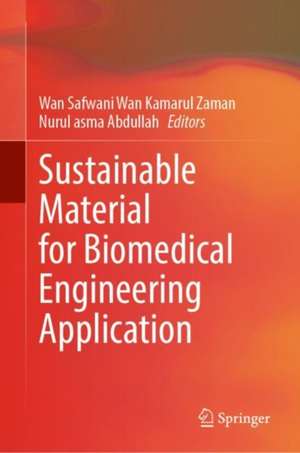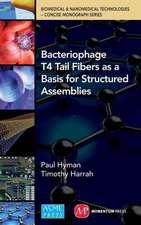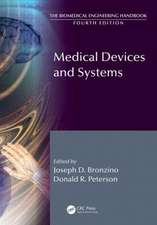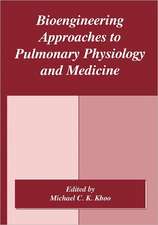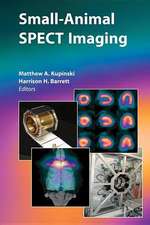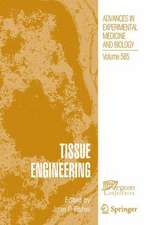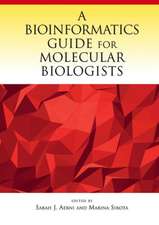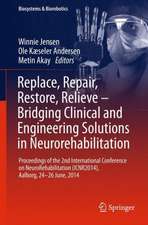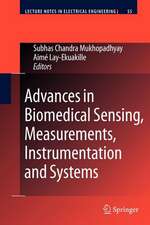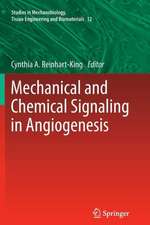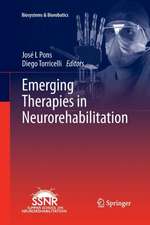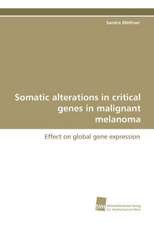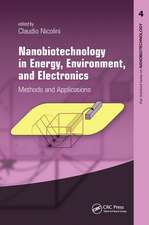Sustainable Material for Biomedical Engineering Application
Editat de Wan Safwani Wan Kamarul Zaman, Nurul asma Abdullahen Limba Engleză Hardback – 2 aug 2023
Preț: 1429.08 lei
Preț vechi: 1504.29 lei
-5% Nou
Puncte Express: 2144
Preț estimativ în valută:
273.49€ • 296.97$ • 229.73£
273.49€ • 296.97$ • 229.73£
Carte tipărită la comandă
Livrare economică 23 aprilie-07 mai
Preluare comenzi: 021 569.72.76
Specificații
ISBN-13: 9789819922666
ISBN-10: 9819922666
Ilustrații: XVII, 499 p. 1 illus.
Dimensiuni: 155 x 235 mm
Greutate: 0.9 kg
Ediția:1st ed. 2023
Editura: Springer Nature Singapore
Colecția Springer
Locul publicării:Singapore, Singapore
ISBN-10: 9819922666
Ilustrații: XVII, 499 p. 1 illus.
Dimensiuni: 155 x 235 mm
Greutate: 0.9 kg
Ediția:1st ed. 2023
Editura: Springer Nature Singapore
Colecția Springer
Locul publicării:Singapore, Singapore
Cuprins
Chapter 1. Utilisation of Human "Wastes" as Materials in Biomedical Engineering Application.- Chapter 2. The Green Approach Based Biomaterials for Tissue Engineering Application.- Chapter 3. Food Waste-Derived Sources: Synthesis, Properties and Applications in Biomedical Engineering.- Chapter 4. Malaysian Seashells Based Hydroxyapatite for Biomedical Application.- Chapter 5 . Chitosan from Marine Biowaste: Current and Future Applications in Tissue Engineering.-Chapter 6. Natural Hydroxyapatite from Black Tilapia Fish Bones and Scales for Biomedical Applications.- Chapter 7. Human Amnion as a Cell Delivery Vehicle for Tissue Engineering And Regenerative Medicine Applications.- Chapter 8. Bioscaffolds and Cell Source in Cartilage Tissue Engineering.- Chapter 9. Lipase Synthesis Using Palm Oil Mill Effluent for Polycaprolactone Production.- Chapter 10. Engineered Microbial Sensing Element-based Biosensor for Sustainable Biomedical Engineering Application.- Chapter 11. Progress in Biomedical Applications using Sustainable Nanoparticles.- Chapter 12. Development of Nanomaterials from Natural Resources for Biosensing and Biomedical Technology.- Chapter 13. 3D Bioprinted Scaffolds from Sustainable Materials for Tissue Engineering: Evolution and Current Challenges.- Chapter 14. Sustainable Biomaterials for 3D Printing.- Chapter 15. Biowaste as Candidates for Future Bone Materials.- Chapter 16. Hybrid bioscaffolds formation using natural and synthetic materials for cartilage tissue engineering: The case of fibrin, atelocollagen and poly(lactic-co-glycolic acid).- Chapter 17. Sustainable Design of Natural and Synthetic Biomaterials for Wound Healing Applications.- Chapter 18. Polysaccharide-Based Injectable Nanocomposite Hydrogels for Wound Healing Application.- Chapter 19. Roles of Sustainable Biomaterials in Biomedical Engineering for Ischemic Stroke Therapy.- Chapter 20. Sustainable Materials for Biomedical Engineering Application in Dentistry.- Chapter 21. Glass Ionomer Cements as Sustainable Material for Restorative Dentistry.- Chapter 22. Mapping The Ethical and Regulatory Issues Of 3D Bioprinting Using Biomaterials in A Low- And Middle-Income Nation: Malaysian Perspectives.- Chapter 23. Ethical And Regulatory Considerations for Sustainable Practices in Biomedical Applications.
Notă biografică
Dr Wan Safwani Binti Wan Kamarul Zaman is currently a senior lecturer in the Department of Biomedical Engineering, Faculty of Engineering, University of Malaya, Malaysia. She is also a registered pharmacist under the Pharmacy Board of Malaysia. Her research interest is in regenerative medicine and tissue engineering with specific interest in human mesenchymal stem cells (MSCs) and its biosafety and bioefficacy, MSCs biocompatibility in bioscaffold and the application of sustainable biomaterial in tissue engineering. She is an active reviewer for a number of national and international journals. She has more than 10 years of teaching experience in human anatomy and physiology, biochemistry and analysis and communication and thinking skills. Dr Wan Safwani has published more than 50 research articles in peer-reviewed international journal and authored or co-authored several book chapters. She is currently serving as an executive member of the Tissue Engineering and RegenerativeMedicine Society of Malaysia (TESMA). She is also a member of the Malaysian Pharmaceutical Society (MPS) and a member of Society of Medical and Biological Engineering Malaysia (MSMBE). She has also served as an advisory committee member for several conferences.
Dr Asma Abdullah Nurul is an Associate Professor and the Head of the Biomedicine Department at the School of Health Sciences, University Science Malaysia. She has more than ten years of academic teaching experience in molecular biology, immunology, microbiology and stem cell and regenerative medicine. Dr Nurul has been engaged in multidisciplinary research which involves biomedicine, material engineering and clinical research in the field of tissue engineering and regenerative medicine. Her main current research interests include understanding the effects of immunomodulation on the molecular mechanism of osteogenic regeneration, development of biomaterials for hard-tissue engineering (dental, bone and cartilage),and cell-based and cell free therapy in regenerative medicine. Dr. Nurul is also an active reviewer for a number of international journals, as well as a reviewer for university and national grants. She has published over 60 full peer-reviewed papers in the related field and authored or co-authored several book chapters. In professional bodies, Dr. Nurul is an active member in various national and international societies. She is currently serving as an executive committee member of the Tissue Engineering and Regenerative Medicine Society Malaysia and the Malaysia Biomaterial Society.
Dr Asma Abdullah Nurul is an Associate Professor and the Head of the Biomedicine Department at the School of Health Sciences, University Science Malaysia. She has more than ten years of academic teaching experience in molecular biology, immunology, microbiology and stem cell and regenerative medicine. Dr Nurul has been engaged in multidisciplinary research which involves biomedicine, material engineering and clinical research in the field of tissue engineering and regenerative medicine. Her main current research interests include understanding the effects of immunomodulation on the molecular mechanism of osteogenic regeneration, development of biomaterials for hard-tissue engineering (dental, bone and cartilage),and cell-based and cell free therapy in regenerative medicine. Dr. Nurul is also an active reviewer for a number of international journals, as well as a reviewer for university and national grants. She has published over 60 full peer-reviewed papers in the related field and authored or co-authored several book chapters. In professional bodies, Dr. Nurul is an active member in various national and international societies. She is currently serving as an executive committee member of the Tissue Engineering and Regenerative Medicine Society Malaysia and the Malaysia Biomaterial Society.
Textul de pe ultima copertă
Sustainable Material for Biomedical Engineering Application discusses current interdisciplinary approaches in the development of materials and their derivatives that are sustainable for biomedical engineering application. Recent advancement of materials research has shown to have great impact on biomedical and clinical applications. With potential for sustainability, the materials discussed and illustrated in this book, may have the ability to increase and contribute to wider therapeutic options for patients. On the other hand, with the advancement in materials technology, they also have positive impacts in terms of reproducibility and more cost-effective manufacturing solutions for biomedical engineering industry. Some of the main aspects covered in this book are utilisation of human waste, food waste and green technology approach for materials in biomedical engineering applications such as tissue engineering, 3D printing and biosensing. A team of experts from various disciplines share recent advances that provide details and integrates different approaches to sustainable materials development. This book is intended for academicians, researchers, students and industrial players in the field of materials and biomedical engineering.
Caracteristici
Supplies a comprehensive review on the recent advancements of sustainable material in biomedical field Provides diverse approach in the development of sustainable materials for biomedical engineering application Covers an array of relevant topics and applications illustrating the usage of sustainable materials
